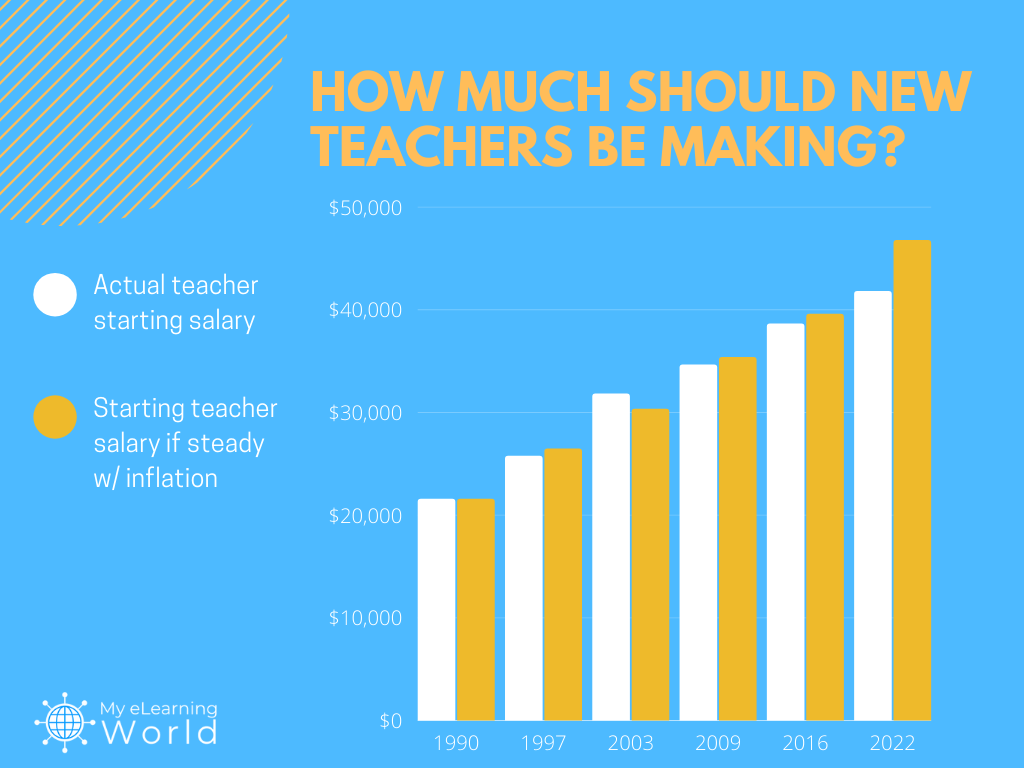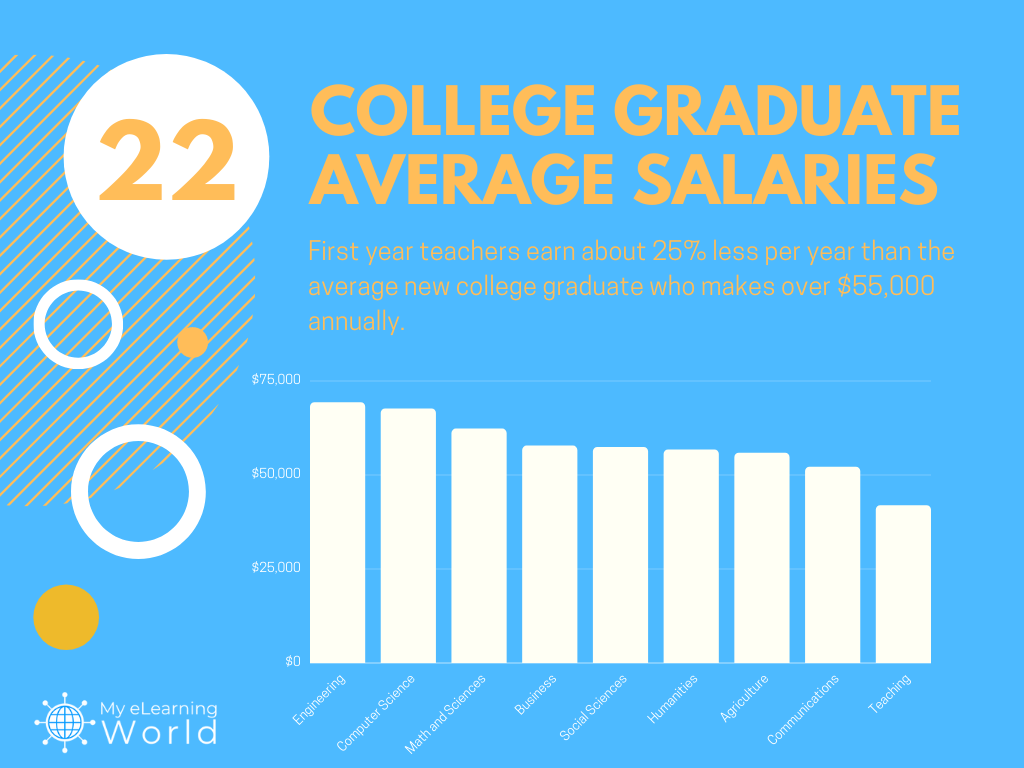Looking for accurate info about the average teacher salary in the United States? Trying to figure out just how much you can make as a teacher? Want to know where school teachers get paid the most?
You’ve come to the right place.
Teachers are in greater demand than ever before, and in many places across the country, there are serious teacher shortages.
The good news is that states are competing to attract and keep the best school teachers by offering higher salaries and better benefits.
In other words, now could be a great time to become a teacher!
But just how much do teachers make in each state at public schools?
In the guide below, we’ll take a closer look at the average teacher salary in each of the 50 states.
Keep in mind that teacher salaries vary not just from state to state, but also within school districts and individual schools themselves. In some cases, a teacher’s salary may be based on years of prior experience, level of education, or the size of the district. The salary range can also vary depending on which grade or subject you teach (i.e. teachers at elementary and secondary schools may earn differently than high school teachers, or a high school math teacher may make a different amount than a PE coach).
Without further ado, let’s take a look at the average teacher salaries in each state at public schools.
What Qualifications Do You Need to Be a Teacher?
Before we go into the data about teacher salaries, let’s quickly touch upon what qualifications you need if you’re thinking about trying to become a teacher.
In order to become a teacher, there are several qualifications that are required.
Most states require that teachers have at least a bachelor’s degree in education or a related field. In some states, you may even need a master’s degree.
Many states also require teachers to complete a teacher preparation program and pass a licensure exam.
In addition, many school teachers are required to complete ongoing professional development in order to maintain their license.
As a result, becoming a teacher requires a significant investment of time and effort.
However, many people believe that the rewards of teaching are well worth the effort. Teachers have the opportunity to make a positive impact on the lives of their students and help to shape the future of our society.
How Much Do Teachers Make?
The average teacher salary at public schools in the United States is $64,133 per year. That’s about 14% more than the national average salary across the country for all types of jobs at $56,310, according to data from the Bureau of Labor Statistics.
Our research also shows that the average annual income for a new teacher in their first year is $41,780.
Of course, the average salary level varies depending on the state and district.
While the pay for school teachers may seem decent on the surface, it’s worth pointing out that about 80% of people think teachers are underpaid.
Not only that, a recent study we did found that new school teachers are actually making 11% less than they were 30 years ago when you adjust for inflation.
We also found that a first-year teacher is earning about 25% less per year than the average new college graduate who makes over $55,000 annually, according to salary data from the Bureau of Labor Statistics.
Teachers are some of the most important people in our society. They shape the minds of our future leaders and help to instill a love of learning in their students.
However, despite their importance, school teachers are often underpaid and overworked.
In many cases, they are forced to purchase their own supplies and work long hours to prepare for classes. As a result, it is not surprising that many people feel that school teachers are underpaid.
In recent years, there has been a growing movement to increase teacher salaries across the United States in public schools and private schools alike.
This is in response to the ongoing problem of teachers leaving the profession due to low pay and inadequate working conditions.
In order to retain experienced teachers and attract new talent to the field, many states have passed or are currently working to pass legislation that significantly increases teacher pay (Illinois, Florida, New Mexico, and Texas are a few examples along with other states).
With that in mind, it seems we can expect the average teacher salary range for public school teachers to increase in the years to come.
The Average Teacher Salary in Each State
Now let’s take a look at the average teacher salary in every state across the country using the latest data from the National Education Association. It’s worth keeping in mind that these average teacher salary figures don’t yet reflect the new pay increases in some of the states that have passed pay increases and changes in salary structures for school teachers.
- Alabama – $54,095
- Alaska – $72,010
- Arizona – $50,782
- Arkansas – $50,456
- California – $84,531
- Colorado – $57,706
- Connecticut – $78,427
- Delaware – $64,853
- Florida – $49,102
- Georgia – $60,578
- Hawaii – $65,409
- Idaho – $52,875
- Illinois – $68,083
- Indiana – $51,745
- Iowa – $58,184
- Kansas – $51,320
- Kentucky – $53,907
- Louisiana – $51,566
- Maine – $55,276
- Maryland – $73,444
- Massachusetts – $84,290
- Michigan – $63,568
- Minnesota – $58,663
- Mississippi – $46,843
- Missouri – $50,817
- Montana – $52,135
- Nebraska – $55,267
- Nevada – $56,672
- New Hampshire – $59,622
- New Jersey – $76,376
- New Mexico – $54,256
- New York – $87,069
- North Carolina – $54,150
- North Dakota – $53,525
- Ohio – $61,406
- Oklahoma – $54,096
- Oregon – $67,685
- Pennsylvania – $70,339
- Rhode Island – $75,336
- South Carolina – $53,329
- South Dakota – $48,984
- Tennessee – $51,862
- Texas – $57,090
- Utah – $54,678
- Vermont – $61,108
- Virginia – $57,665
- Washington – $76,743
- West Virginia – $50,238
- Wisconsin – $59,431
- Wyoming – $59,786
FAQ on Average School Teacher Salary
Do teachers earn good money?
While teachers earn more than many other professions, many still feel that they are underpaid. This is because, when compared to other jobs that require a college degree, school teachers earn relatively low salaries.
In which states do teachers make the most money?
Teacher salaries vary greatly from state to state. Some states, like Alaska and New York, have high average salaries for teachers. Other states, like Mississippi and South Dakota, have much lower average salaries. However, it’s important to remember to adjust for the cost of living when comparing the average teacher salary across states. Just looking at the highest average might not tell the full story on its own.
What is the average salary for a first-year teacher?
According to our estimates, the average teacher salary for a first-year professional is about $41,780. New teachers earn less than the average salary for all other college graduates.
What kind of teachers make the most?
In general, high school teachers earn more than elementary school and middle school teachers. However, this varies greatly from state to state. Additionally, teachers with more prior experience and higher levels of education typically earn more money than those who are just starting out. Also, teachers in STEM subjects like chemistry, physics, biology, and computer science tend to earn a bit more than their counterparts and be in higher demand.
Does the size of the district matter?
Yes, the size of the district does matter when it comes to teacher salaries. School districts that are located in more affluent areas generally offer their teachers higher salaries than those in poorer areas. Additionally, school districts that have a greater number of students usually offer their teachers more money than those with fewer students.
Do teacher salaries go up over time?
Yes, teacher salaries typically go up over time as teachers gain experience and earn more advanced degrees. In some cases, a teacher’s salary may also be based on the number of years they have been teaching.
Do teachers get paid during the summer?
Yes, most teachers get paid during the summer, provided they signed a contract with a 12-month pay structure. If a teacher signed a contract with a 9 or 10-month pay structure, they won’t get paid over the summer break.
Have median annual wages for teachers kept pace with inflation?
No, the median salary for teachers has not kept pace with inflation. When adjusted for inflation, the median annual wage for school teachers has actually decreased over the years.
A Final Word on Teacher Pay
Being a teacher can be a very rewarding career financially and personally, but it’s important to remember that teacher salaries vary greatly from state to state and district to district.
Additionally, salaries for school teachers usually go up over time as teachers gain experience and advanced degrees.
Likewise, the grade level and subject you’re teaching can influence your pay (e.g. high school teachers tend to make a little more than elementary or middle school teachers).
So, if you’re thinking about becoming a teacher, be sure to research the average salary in the state where you want to teach.
We hope this guide provides some clarity on the matter and helps you in your career journey.
Have any questions about how much school teachers make? Comment below and we’ll help.



